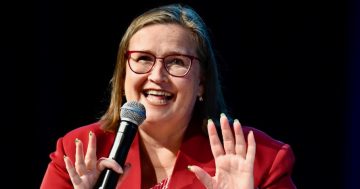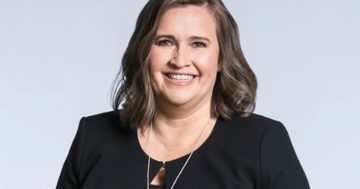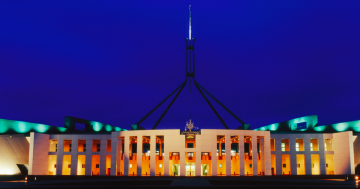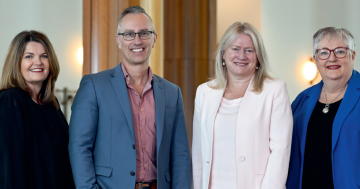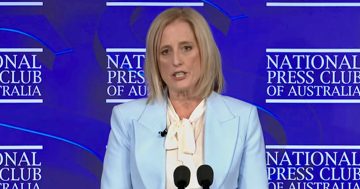Alley Pascoe* says Sex Discrimination Commissioner, Kate Jenkins (pictured) has reflected on what she’s seen in her 30-year career campaigning for equality and how this moment is a catalyst for change.
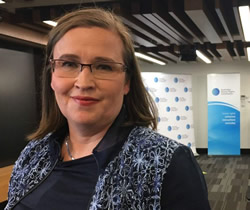 When Kate Jenkins was growing up in the ‘70s on her family orchard in outer Melbourne with two brothers, she vividly remembers watching a news report about Deborah Lawrie (known as Deborah Wardley while married), becoming Australia’s first female pilot to fly with a major airline after winning a landmark sex discrimination case again Ansett Airlines.
When Kate Jenkins was growing up in the ‘70s on her family orchard in outer Melbourne with two brothers, she vividly remembers watching a news report about Deborah Lawrie (known as Deborah Wardley while married), becoming Australia’s first female pilot to fly with a major airline after winning a landmark sex discrimination case again Ansett Airlines.
“I have a very strong memory of seeing Deborah on the front page of the newspaper when she went to the High Court after being denied a role as a pilot purely on the basis of sex. As a 10-year-old girl, I was enraged,” recalls Jenkins.
“There was something about Deborah’s story that made me realise that being a woman didn’t mean I was a lesser person and that I should have the same opportunities as my brothers.”
Jenkins’ childhood outrage for a wronged pilot ignited a lifelong crusade against discrimination.
After studying law at Melbourne University, she spent 20 years as lead equal opportunity partner at Herbert Smith Freehills law firm before becoming the Victorian Equal Opportunity and Human Rights Commissioner in 2013 and then the Sex Discrimination Commissioner at the Human Rights Commission in 2016.
In this role, Jenkins led the historic National Inquiry into sexual harassment in Australian workplaces and is currently heading up an independent review of the culture of Parliament House following horrific allegations of rape, abuse and harassment within the building’s hallowed halls.
Next month, Jenkins will deliver a keynote at the Australian HR Institute’s Diversity and Inclusion Conference about Australia’s sexual harassment crisis and her hopes for the future of equality.
Here, she tells journalist Alley Pascoe that the time for change is now.
“Well, the change should have happened 30 years ago when the Sex Discrimination Act was registered, but the structural and attitudinal barriers were deeply embedded,” she says.
“Things have shifted now and we’re at a turning point. We’re not going back to the way things were, we have to change this now.”
Women’s Agenda: What has it taken for Australia to get to this moment in time, where real change is happening, and women are demanding better from their workplaces and society as a whole?
Kate Jenkins: We’ve come to this turning point by building on the momentum and awareness created by those before us. Since the Sex Discrimination Act in 1984, we’ve seen change happen, but the movement really built from 2017 when #MeToo ignited.
At the time, there were articles that said #MeToo failed in Australia. But social change doesn’t happen because of a hashtag, it happens because of engagement, Government awareness and evidence-based research, which is what the Human Rights Commission has been doing.
In some way, the March4Justice [which happened in March across Australia] is symbolic of the conversations that have built from 2017.
We all know our workplaces need to be safe and respectful for everyone; and we’re not going to let the people in power off the hook.
WA: It certainly feels like this moment is a culmination of a lot of work by a lot of women over many years.
Why are you hopeful that this will lead to actual change?
Kate Jenkins: I am confident for a few reasons. The wider community – both women and men – are looking to the Government expecting change.
And I do think the Government has heard their voices, because they’ve engaged the Human Rights Commission to look at the parliamentary workplace and make recommendations.
This inquiry will provide evidence-based solutions and clear paths forward. It’s not a hashtag, it’s looking at the problems and finding solutions with cross party support.
The other reason I’m very optimistic is that following the Respect@Work inquiry, the Government has said they agree with the 55 recommendations and are working to implement them.
The final reason for my hope is the nature of conversations I’m having.
The people engaging in these conversations with me probably wouldn’t have done so five years ago.
So, by expanding the number and diversity of people thinking about women’s safety, there’s a real chance for change.
That’s why I’ll look back and say 2021 was a turning point.
WA: How have you experienced inequality in your own career?
Kate Jenkins: I’ve been very privileged as an able-bodied, white women. But, looking back, I think if I’d have been a guy, I would have become an engineer because I was a math/science student.
But I chose law because engineering wasn’t very welcoming [to women].
I can name so many moments in my career where I faced barriers and assumptions that women couldn’t do certain work.
I would say a lot of women of my generation have looked at the stories that have come out in the last 12 months and been triggered with memories from their career: of sexual assault, harassment, pain, injustice and gendered barriers. There’s a grief in women knowing they haven’t got to where they could have gotten in their career if we had true equality.
It’s dismaying to realise that we haven’t made the progress that the country committed to in 1984.
But now these stories have come to the surface, I know the people speaking will make a real difference.
WA: What’s the first step we need to take to implement the 55 recommendations you made in the Respect@Work: Sexual Harassment National Inquiry Report?
Kate Jenkins: That’s like asking me to pick which one of my 55 kids is my favourite!
If I oversimplify it, I think we firstly need legislative reform to simplify, clarify and make the laws more straightforward.
When there’s confusion in the underpinning laws, it dilutes the chance of workplaces following them, so the legislative change is important.
The legislation has to be clear that employers are responsible for providing a safe and respectful workplace – and then workplaces need to think about prevention and step up. While this is happening, there needs to be independent support, safety and information for victims.
We need a victim-centric approach to reduce harm and prevent lifelong trauma.
For wider community change, we need to continue conducting research and gathering data and information to underpin our work, and to keep having conversations about reducing violence, promoting gender equality, educating young people and better reporting.
WA: You are a keynote speaker at AHRI’s upcoming Diversity and Inclusion conference. What does real inclusion look like to you?
Kate Jenkins: Real inclusion means every single person feels like they’re welcome and able to reach their full potential at work.
It means everyone can bring their whole self to work and feel safe, not fearful or afraid.
WA: Why should organisations make diversity and inclusion a priority?
Kate Jenkins: There’s multiple reasons. Fundamentally, it’s the right thing to do.
But also, the evidence is really clear that diverse organisations with inclusive leadership teams and gender balance, deliver better results and enable more innovation.
So, ensuring people have their human rights respected and having a more productive and successful team are two sides of the same coin.
WA: It’s a win win. As the Sex Discrimination Commissioner, you really are leading the movement against sexual harassment.
How are you coping with that pressure and finding the strength to keep fighting the good fight?
Kate Jenkins: Personally, I’m very motivated by this moment in time, but I have had to manage my diary better so I can perform to the best of my ability.
I’m grateful for the nation-changing work we’re doing.
I’m definitely not the only one doing this work, there are people across the country, and I’m inspired by everyone marching, speaking out and contributing.
*Alley Pascoe is a freelance journalist and editor who has written for Marie Claire, The Australian Women’s Weekly and Women’s Health News.
This article first appeared at womensagenda.com.au.


